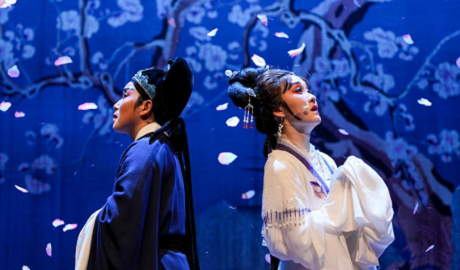

In 2007, Put Down Your Whip, an iconic oil painting by Xu Beihong fetched 71.28 million yuan at an auction – a record-breaking price for Chinese art.
Rewind to 1939. While holding an exhibition in Singapore to raise funds for the Chinese people’s war of resistance against Japanese aggression, Xu Beihong came across a street drama performed by the New China Troupe. Deeply moved by the celebrated actors Jin Shan and Wang Ying, Xu’s brush was ignited. In just ten days, he completed an oil painting inspired by the performance. The writer Yu Dafu was spellbound, remarking, “Within the canvas unfolds a living play—crowds upon crowds gathered to watch Fragrance.” Amidst the ravages of war, Put Down Your Whip not only rallied patriots to the resistance but also gave birth to two enduring masterpieces—one on the stage, the other on canvas—a testament to the power of art in transcending its form and inspire.
To trace the origins of Put Down Your Whip, one must rewind to the literary world of 1928. That year, Chinese playwright Tian Han – famed for later penning China’s national anthem – adapted a fragment of Goethe’s novel Wilhelm Meister’s Apprenticeship into a one-act play titled Meiniang. The vignette was simple yet poignant: a sickly young girl is forced by her gypsy father to busk for money; as he raises a whip to strike her for a poor performance, a brave young man in the crowd intervenes to stop the cruelty. Though brief, the piece packed intense emotion – a mix of tender pleading and sharp conflict that struck a chord with audiences.
Fast-forward to 1931. Inspired by Tian Han’s mini-drama, a director and writer named Chen Liting reimagined the story for contemporary China. At the time, Chen had witnessed streams of refugees fleeing famine, warlord strife and poverty. He transposed the European tale to a Chinese street corner, renaming it Put Down Your Whip. In Chen’s version, an old busker and his daughter Fragrance (Xiangjie) perform folk songs and acrobatics in the street. The frail girl falters from hunger, prompting her father to raise his whip – at which point a youth from the gathering crowd steps in, shouting the now-famous line: “Put down your whip!” A scuffle ensues. To everyone’s surprise, the girl then defends her father, tearfully explaining that they are destitute refugees, driven from their home by “war, bandits, and oppressive taxes.” Moved by their plight, the onlookers’ frustration turns to sympathy. Chen’s play debuted on October 10, 1931, in a Shanghai suburb. Originally, its message was aimed at abusive warlords and a neglectful government, urging people to resist those forces of misery. The straightforward plot and heartfelt delivery made the one-act drama accessible and stirring, a quality that would soon prove invaluable.
As the 1930s progressed, China’s crisis deepened. Japanese aggression intensified, especially after the invasion of Manchuria in 1931 and escalating incursions through the decade. The Chinese populace seethed with anger and patriotism. Sensing the changing tide, Chen Liting revised Put Down Your Whip to directly address the national struggle. He shifted the setting to recently occupied Northeast China (Manchuria) and recast the busker family as war refugees from that region. In this new version, the girl Fragrance reveals that her mother had been killed by Japanese invaders – a pointed indictment that electrified audiences. Instead of simply decrying local tyranny or hardship, the play now became an explicit call to resist Japanese imperialism. In performances, the young hero no longer urged rebellion against a vague oppressor; he urged his countrymen to unite and defend the motherland from invasion. The emotional core remained the same – a suffering family and a righteous intervention – but the target of outrage was crystal clear.
From 1937 onward, as full-scale war with Japan erupted, Put Down Your Whip spread like wildfire. It is estimated that over 70% of all street or village performances during the war years included this play – an astounding prevalence. Many versions and troupes sprang up, each adding local touches but keeping the incendiary spirit. The play’s very format made it ideal for mass impact: it was performed in open-air markets, temple courtyards, and roadways – wherever a crowd could gather. There was no stage barrier; actors and audience mingled in the same space, blurring the line between performer and spectator. As the drama reached its climax – the young man’s confrontation with the tyrant figure and the daughter’s lament – emotions would surge in the crowd. At that peak, actors and audience often shouted in unison patriotic slogans like “Down with Japanese imperialism!” and “Drive them back home!” The experience was cathartic. People tossed coins and bills onto the “stage” (even if it was just bare ground) to help the fictional refugee girl Fragrance, as if by aiding her they were aiding China itself.
The impact of Put Down Your Whip was vividly captured in countless anecdotes from the war years. In April 1937, before the war had officially erupted nationwide, two young actors – Cui Wei and Zhang Ruifang – staged the play in Beiping (Beijing) for a rally of students. Over 2,500 students had gathered at Fragrant Hills under the covert guidance of underground resistance organizers. Lacking costumes, Cui and Zhang borrowed tattered clothes from nearby peasants to portray the destitute father-daughter pair. Cui donned an old cotton robe tied with a rope and a brimless felt hat jury-rigged with a newspaper visor; Zhang wore a peasant girl’s jacket and floral pants. They even rented a street performer’s carrying pole to enhance the realism. Performing in the open air, they poured their own anger and sorrow into the roles, vowing not to live as slaves under foreign conquest. The students watching were enthralled – and notably, so were the Nationalist government police and soldiers sent to monitor the rally. The authorities were initially unaware this was an act of anti-Japanese drama; by the time they realized, the raw emotion of the performance had overcome them as well. They stood by without intervening. When the play ended, one police captain was so moved that he bought sodas for the actors. “My family is from the Northeast too,” he told them with tears in his eyes. “I also refuse to be a slave to a lost country.” In that moment, the show transcended politics – it was pure shared patriotism.
Similar scenes played out across occupied and free China. In late 1937, as Japanese troops pressed inland, a women’s relief troupe from Shanghai trudged through winter cold to reach General Fu Zuoyi’s soldiers on the front lines in Inner Mongolia. They performed Put Down Your Whip right on the battlefield after a victorious defense. Hardened soldiers, fresh from repelling an enemy attack, watched the familiar drama of a poor girl and her father. When the heroine cried out against the Japanese, the entire company of troops erupted in a roar, “Drive the Japs to their hometowns!” – a thundering vow to expel the invaders. The men, already steeled by combat, now had their emotions validated and purpose clarified through art.
In another instance in early 1938, the Shanghai Salvation Drama Troupe brought the play to a small village in Shanxi province. Partway through the performance, as the abusive “father” character raised his whip, an elderly farmer in the audience suddenly rushed the stage and struck the actor in the back with a shovel! Thankfully, other spectators intervened before any harm was done. When things calmed, the old man broke down sobbing. He was a refugee from the Northeast – his own son had been an officer in the army fighting the Japanese, but was now missing after the fall of their hometown. Seeing Put Down Your Whip had hit painfully close to home, blurring the line between drama and reality. The old man’s impulsive attack on the actor playing the oppressor showed just how deeply the little street play could cut into the national wound.
As Put Down Your Whip spread, it became the signature piece for numerous performers. Some actors would go on to tally over 2,000 performances of the play in their lifetime. Troupes under the banner of “resistance drama” crisscrossed the country – for example, Shanghai’s second Rescue Theatre Team toured Central and South China from late 1937 to mid-1939, staging Put Down Your Whip hundreds of times. Professional actors and directors embraced it, but so did student groups at universities like Zhejiang and the Southwest Associated University. In fact, for many young Chinese who later became famous writers, artists, or actors, this little play was their first taste of performing. The writer Wang Dingjun recalled that the War of Resistance gave him “a number of firsts” – including the first time he ever acted on stage, which was in Put Down Your Whip. Likewise, the renowned novelist Nie Hualing reminisced that as a middle school girl after the Marco Polo Bridge Incident in 1937, she and her classmates joined a makeshift troupe to perform Put Down Your Whip in support of the resistance.
Looking back, Put Down Your Whip not only galvanized countless Chinese to stand up against oppression but also left an unusual double legacy in both theater and fine art. Decades later, its story still evokes the indomitable spirit of that era. The echo of that young man’s cry “Put down your whip!” and the vision of a nation rising in response remain profoundly moving, even today.


Chinese Yue Opera reimagines classical tales in London for contemporary audiences

Tourism boosts local economy in Bamei Village, China's Yunnan

In pics: Wild populations of Milu deer reestablished in China after 40 years of conservation efforts

China's "Avatar" city Zhangjiajie rises as a global tourism magnet
点击右上角![]() 微信好友
微信好友
 朋友圈
朋友圈

请使用浏览器分享功能进行分享
